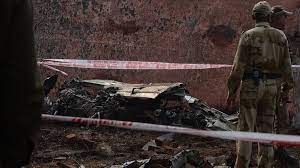While death of India’s first chief of defense staff creates void in defense structure, it has no impact on military operations.
NEW DELHI (AA) – As India is still awaiting the appointment of a new chief of defense staff (CDS) following the death of Gen. Bipin Rawat earlier this month, analysts fear the defense sector reform process may suffer, if only temporarily.
India’s first CDS Gen. Rawat and his wife were among 13 killed when a helicopter crashed in the southern province of Tamil Nadu on Dec. 8.
Speaking to Anadolu Agency strategic analyst Pravin Sawhney said while the government has made it clear to go ahead with military reforms, which Gen. Rawat had started, it needs to be seen, whether they (government) will do reforms with or without appointing his successor.
“I think there will be a temporary halt to his reforms. But as far as the government is concerned, it has made it very clear that they will go ahead with the military reforms which he had started,” said Sawhney, who also edits a security journal the Force.
Analysts believe that the creation of the post of CDS over the head of three service chiefs was not easy for the Prime Minister Narendra Modi government.
Soon after the 1999 limited war with Pakistan on the heights of Kargil in the disputed region of Jammu and Kashmir, a high-level committee had found gaps in the coordination between the army, air force, and the navy along with different intelligence wings.
To bridge such gaps in the future, it had recommended the creation of the post of chief of defense. But keeping in view the structure of defense forces in the country and the fear of concentrating authority in a single person, successive governments delayed the decision for about 20 years, believe the analysts.
Sameer Patil, a Mumbai city-based security analyst and a former senior official at the National Security Council Secretariat – a body that advises the prime minister on key strategic issues — said that the death of Gen. Rawat has been a setback for the process of military reforms.
– Trust of political leadership
Maintaining that Rawat had the trust of political leadership, Patil said he had embarked on indigenization projects by prioritizing the weapons and platforms.
“He had the trust of the political leadership, which probably his successor won’t have,” said Patil.
Before becoming India’s first CDS in 2019, Gen. Rawat had served as army chief.
Patil said after taking over, he had conceived the idea of setting up five theatre commands to combine army, air force, and naval assets under a single command to ensure joint combat capability.
“These commands would replace the existing 17 service-specific commands. These commands would combine the assets of the three services,” he said, adding “that his passing away would delay the country’s integration plans for now”.
Currently, India has two integrated theatre commands: One, set up in the Indian Ocean and named the Andaman and Nicobar Command, and the second Strategic Forces Command, which looks after India’s nuclear assets.
“The creation of the CDS was long due. It could not be appointed earlier because there were persistent turf battles between the three services,” said Patil.
He added that both navy and air force were reluctant to cede space to an already dominant army.
“But Modi government demonstrated the political will to keep aside these differences and finally create the post,” he said.
Sushant Singh, a senior fellow at the New Delhi-based Centre for Policy Research told Anadolu Agency that the next CDS will have to complete the task of creating the theatre commands started by Gen Rawat.
He said that the task requires a smooth relationship with the bureaucracy, the three defense services, and the political leadership.
“It is in this aspect that the next incumbent will face the biggest challenge,” he said, adding that it is hard to predict any timeline for something on which a broad agreement is yet to be achieved.
– Many responsibilities
“He (Rawat) wore three hats, of the chief of defense staff, the secretary of the Department of Military Affairs and the permanent chairman of the Chiefs of Staff Committee,” he said.
“It was in his role as the CDS that he was undertaking activities to create integrated theatre commands, but that is an institutionalized process which should proceed without much trouble,” said Singh.
Mandeep Bajwa, a military historian said that the modernization program, will not have any major effect.
“Everyone at the higher echelons of the military is committed to modernization in terms of equipment, weapons, doctrine, technology, and best practices. Whoever steps in will continue the program,” he said,
Patil pointed out that while Rawat was going ahead with the idea of theater commands, it was not completely supported by everyone.
“Gen Rawat’s dismissal of navy’s proposal for a third aircraft carrier and description of the air force as a supporting arm only heightened concerns within these two services,” he said.
– Four tasks
Explaining the significance of the post, Sawhney said it does four things.
“Firstly, CDS is the military advisor to the defense minister. Secondly, a new department has been created i.e., Department of Military Affairs under the Defense Ministry where you have both civilians and military bureaucrats and the whole idea was that all military issues could be expedited,” he said.
Also, since CDS is the permanent chairman of the chiefs of staff committee, in that capacity, the post has a direct operational role.
“Lastly, he (CDS) is directly in the nuclear weapons loop with the NSA (national security adviser). So, these are four significant tasks which were given to him,” he said.

